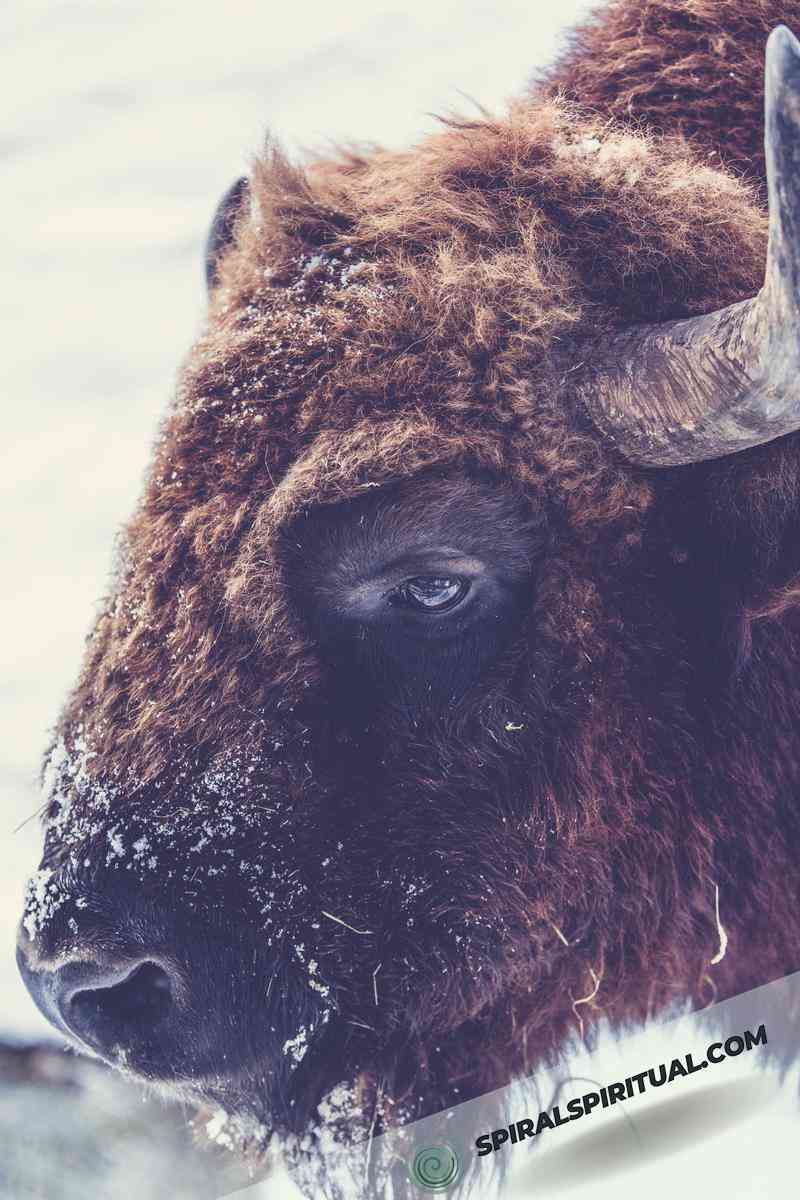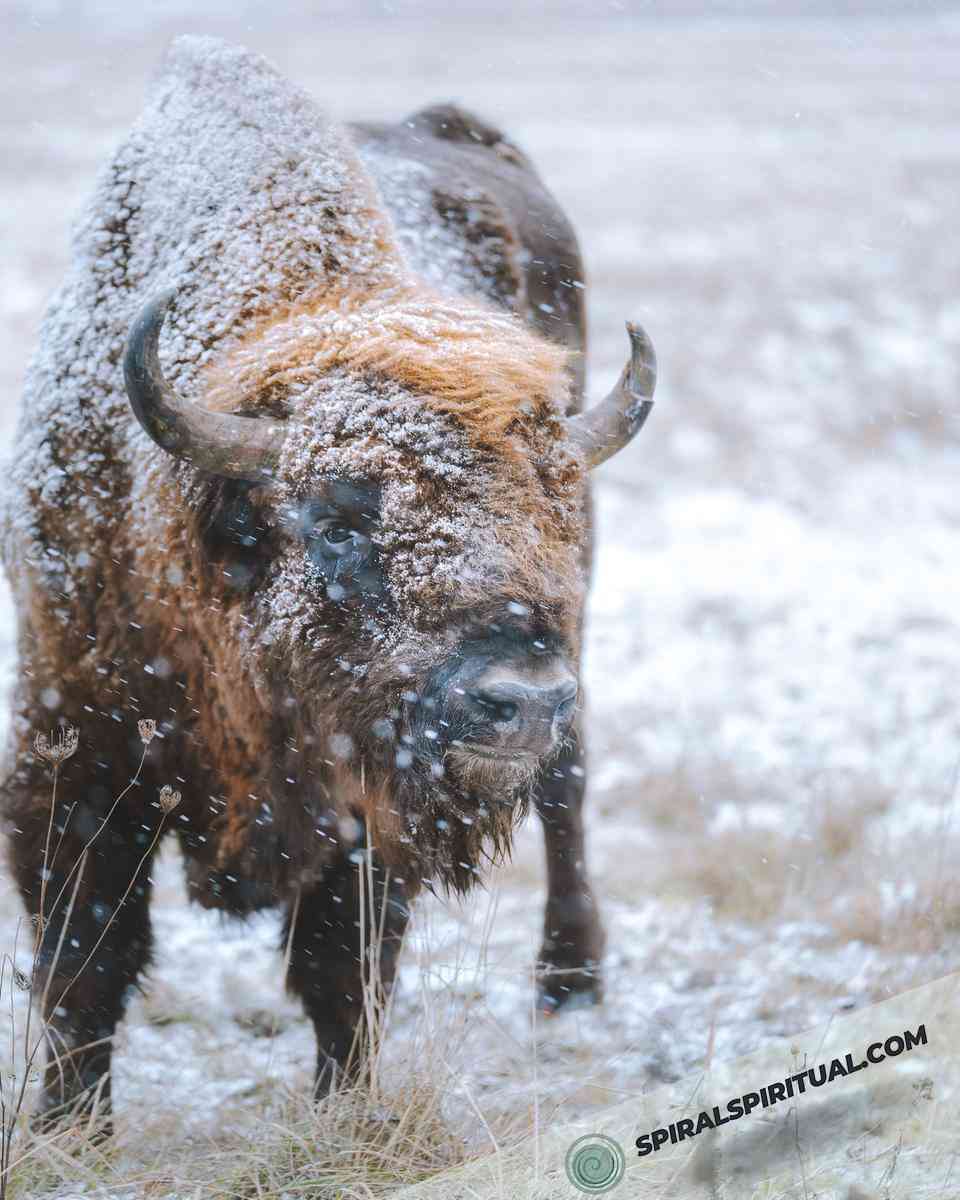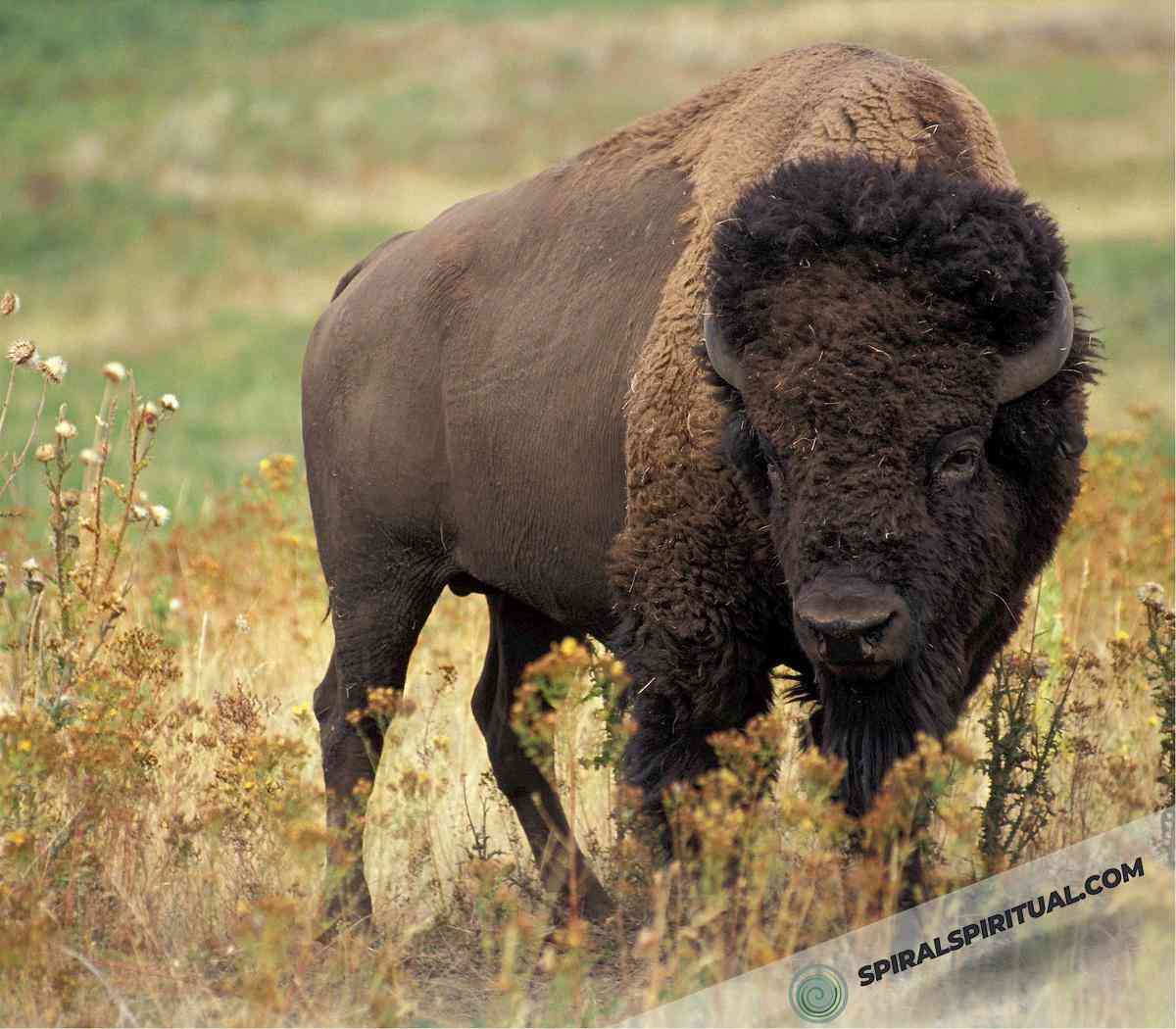Bison Spiritual Meaning and Symbolism
According to Native American spiritual beliefs, bison symbolize abundance, strength, and grounding. They are revered for their connection to the Earth and are seen as powerful, sacred beings.
Bison represent the essence of survival and resilience, as they have withstood adversity throughout history. They also embody a sense of unity and community, emphasizing the importance of harmony and cooperation.
5 Spiritual Meanings Behind the Bison
My friend Sarah had an amazing experience with a bison that changed how she sees things. While hiking, she came across a huge, calm bison just eating grass. Watching the strong, peaceful animal, she felt deeply connected to nature and very peaceful inside. The bison now reminds Sarah to stay strong when life gets hard. It teaches her to find power and harmony in herself.
Bison hold numerous spiritual meanings across various belief systems and symbolize several aspects beyond cultural contexts. Here are five general spiritual interpretations associated with bison:
- Abundance: The bison is a symbol of abundance because it gave Native Americans so much – food, clothing, tools. This idea of the bison providing many things extends to it representing abundance in a spiritual way too. It stands for having enough of what you need to live well – money, success, happiness.
- Strength and Resilience: Bison show great physical power and toughness. They have lived through tough conditions, attackers, and dangers to all bison. As a spiritual symbol, bison can inspire people to find their own inner strength. This helps when people face difficulties on their personal paths or in life.
- Grounding and Connection to Earth: Bison are very connected to the land. Their solid presence and closeness to the ground is a reminder for us. It shows we should also feel rooted, balanced, and connected to nature – in our spirits and daily life. The bison represent having an peaceful relationship with the earth we live on.
- Unity and Community: Bison live together in groups and are close with each other. They show the strength that comes from unity and teamwork. For our spirits, bison remind us of the energy and links between all people in a community when they work together supporting one another.
- Wisdom and Spiritual Guidance: Bison are seen as wise, spiritual guides. Their calm and thoughtful way of moving through large areas shows they have deep understanding. This makes them symbols of wisdom, enlightenment, and trusting oneself. They encourage people to connect with their own inner truth. This helps as they find their way on their personal spiritual journey.
Different cultures and Native beliefs see the bison’s spiritual meaning in different ways. The ideas shared here give a general sense of how bison are seen as spiritual symbols across groups. But specific tribes or faiths may think about the spiritual power of bison differently based on their traditions.
The Symbolism of Bison in Different Cultures
Native groups view the bison as spiritually important, but have different beliefs on what it stands for. Many see it as representing abundance, power, and how all living things are connected. In their cultures, the bison captures the spirit of surviving, lasting, and bouncing back. So it acts as a wise teacher and guide. But exactly what the bison means can differ tribe to tribe based on their values.
In Norse myths, bison are connected to gods of fertility and wealth – so they stand for having enough food, resources, and nurturing. Ancient European groups like the Celts also respected bison for their power, stability, and safety. Bison showing up in ancient cave art shows these cultures gave them spiritual meaning.
Across all cultures, bison have shared meaning. Seeing them in cave paintings and their use in rituals shows they represent a basic vitality, sacredness, and natural strengths going back to ancient times. Their symbols tap into core truths about the spiritual essence of the physical world we live in.
Bison Color
| Color | Symbolism |
|---|---|
| White | White is often associated with purity, innocence, and spiritual enlightenment. It can symbolize a connection to the divine, higher consciousness, or spiritual awakening. White bison have been considered sacred in certain Native American cultures, representing harmony and the unity of all living things. |
| Black | Black is commonly associated with power, mystery, and transformation. It can represent the hidden or subconscious aspects of life and the journey of self-discovery. Black bison may symbolize inner strength, resilience, or the ability to navigate through the unknown. |
| Brown | Brown is often connected to the earth, stability, and grounding. It can represent a sense of connectedness to nature, fertility, and abundance. Brown bison may symbolize strength, reliability, and a deep connection to the land. |
| Red | Red is frequently associated with vitality, energy, and passion. It can represent life force, courage, or intense emotions. Red bison may symbolize the importance of vitality and assertiveness, as well as the ability to overcome challenges. |
| Gray | Gray is often linked to neutrality and balance. It can represent wisdom, maturity, and a sense of calmness. Gray bison may symbolize a balanced approach, adaptability, and the ability to find harmony in different situations. |
| Blue | Blue is commonly associated with spirituality, tranquility, and healing. It can symbolize peacefulness, emotional stability, and the pursuit of inner peace. Blue bison may represent a spiritual journey towards enlightenment and the connection to higher realms. |
Is a Bison a Good Omen?

Some people believe that holding a bison as a pet can bring good fortune or serve as a symbol of positive omens. This belief stems from the association of bison with strength, resilience, and a deep connection to nature. Bison are often seen as symbols of abundance, stability, and harmony. By keeping a bison as a pet, individuals may hope to invite these positive qualities into their lives and create a sense of spiritual or symbolic connection with the natural world.
If They’re Appearing in Your Dreams
The meaning of bison in dreams can vary depending on the individual and their personal associations with this majestic animal. According to dream interpretation experts, bison appearing in dreams can symbolize strength, power, and a connection to the primal instincts within oneself. It may represent a need for grounding, stability, and a reminder to tap into one’s inner resources.
A bison in a dream carries the energy of digging in and reconnecting to the most primal aspects of your life, and feeling the power of moving forward from that place.Dr. Michael Lennox
If You See a Dead Bison

If you see a dead bison in your dream, it may indicate the end of a significant phase or aspect of your life. According to dream experts, a dead bison can symbolize the loss of strength, power, or vitality within oneself. It may represent feelings of defeat, stagnation, or a need to let go of the past.
Let go of whatever that animal represents to you and move on.Lauri Loewenberg
Reflecting on your current circumstances and emotions can provide deeper insight into the specific meaning and implications of a dead bison appearing in your dream.
The Final Verdict
The spiritual symbolism of bison spans across cultures, showcasing their associations with strength, harmony, vitality, and primal energy. Varied color meanings offer insights into purity, power, grounding, and more. When bison appear in dreams, they may indicate grounding, inner strength, or the need for self-discovery. These spiritual aspects woven into the symbolism of bison highlight their significance as majestic creatures embodying timeless wisdom and profound connections to nature and the human psyche.
References
Here is the literature that was used for writing this article:
- “Bison: Monarch of the Plains” by Dale F. Lott, University of California Press, 2002.
- “Buffalo Nation: American Indian Efforts to Restore the Bison” by Ken Zontek, Montana Historical Society Press, 2007.
- “The Sacred Paw: The Power of Bison Symbolism in Native American Cultures” by Robert H. Keller, Bison Books, 1994.


